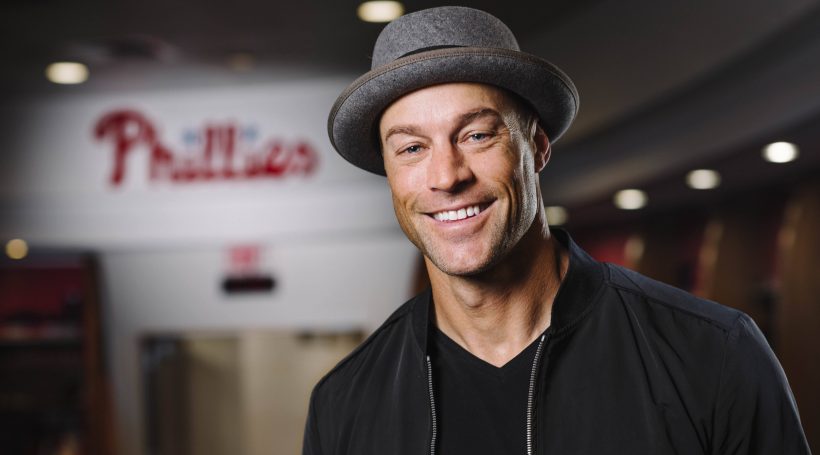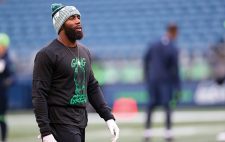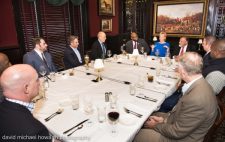The new Phillies manager got off to a rough start this season, with fans flipping from “Let’s see what he does” to “He’s gotta go” after only a few games. But the score always changes. And Gabe Kapler’s modern philosophy and game strategy is starting to warm up fans. For him, though, there’s a job to do and a game to play, so he ignores the buzz. All he wants Philly fans to know is he shares their one goal: another parade.
If you’re looking for a 2018 Phillies season prediction, here’s one you can take to the bank: This will be a season like no other in the team’s 135-year history.
That’s because their newly minted manager, Gabe Kapler, is like no other field boss in Phillies annals. Or any team’s, for that matter.

Gabe Kapler with his sons Dane and Chase Photo: Margo Sugarman/Israel Association of Baseball
After all, Kapler, a 42-year-old native of the Los Angeles suburb of Reseda, California, is someone whose musical tastes run the gamut from rap icon Tupac Shakur to jazz avatar Miles Davis to 19th-century classical composer Franz Schubert (the latter courtesy of his classically trained musician-father).
On the field, in his first managing job above the single-A level, Kapler is likewise proving to be an outlier: He has taken the virtually unprecedented steps of having defensive players switch positions during the course of an inning, and he has made it a priority that his non-pitchers be able to play more than one position, rather than specializing on defense, as has been the case pretty much forever.
Nonetheless, you’d be wrong to view Kapler as some eccentric outsider who somehow lucked into the job of the Phillies’ 54th manager. Despite his unconventional-for-the-game ways, he is a baseball “lifer.”
“I started when I was 5 years old,” he says. “My older brother played at the park down the street. I ended up playing at the park down the street. Organized baseball began on a T-ball team. I still have pictures of taking rips off that tee with big, bushy hair flowing out of the cap. I remember like it was yesterday.”
Mostly, he continued, he remembers an idyllic early life.
“My childhood was amazing,” he recalls. “I had two parents who allowed me to be free in my neighborhood. In the summer, I basically left the house early in the morning and I was on skates, and bikes, and playing baseball essentially all day long. I’d come home at the end of the day and it would be dark.”
Curiously, although he grew up in Southern California, Kapler’s allegiance was never pledged to the Dodgers. Instead, he grew up a Toronto Blue Jays fan because his T-ball team was named the Blue Jays.
“My first-ever baseball hero was Pete Rose,” he says. “I had a dog named after Pete Rose. One of my earliest memories is a picture of me in a red-satin Phillies jacket from the early ’80s. But my team was the Blue Jays. As I fell deeper and deeper in love with the Blue Jays, I began to know every player on the team. I can still recite their names to this day.”
“My second hero, who remained my hero up until my high school days, was Fred McGriff,” he adds, name-checking the Toronto slugger who was known as “Crime Dog” after McGruff, the animated hound featured in a series of anti-crime public service TV spots.
Kapler was drafted as an outfielder by the Detroit Tigers with the 57th pick in 1985. In all, he played 12 major-league seasons with the Tigers, Dodgers, Texas Rangers, Boston Red Sox, Milwaukee Brewers and Tampa Bay Rays. While never a marquee player, he turned in a respectable lifetime stat-line of .268 batting average, 68 home runs and 386 runs batted in.
Kapler retired after the 2006 season and spent the next year managing the Red Sox’s low-minor affiliate in Greenville, South Carolina. He went back to playing in 2008 and retired for good after the 2010 season, becoming an analyst for Fox Sports1. From 2015-2017, he served as the Dodgers’ director of player development, a job that did not put him in uniform. Interestingly, he instituted a Phillies policy that has traditionally non-uniformed staffers, including members of the franchise’s ever-expanding analytics department, occasionally donning the red-pinstriped Phillies “uni,” he explains, to better integrate the on-field staffers with those who work in the team’s office.
Apart from his season in Greenville, his only other managerial experience was supervising the Israeli team in the 2013 World Classic series. This has caused some fans and media types to question his credentials to run a major-league team.
“I would say that I am a baseball guy,” he offers in a thoughtful, measured manner. “I have been in dugouts for my whole adult life, and even back to my childhood. Preparing for game situations is where I’m most comfortable. I think fans can rest assured that I won’t be out-prepared. That’s number one.”
“Number two, I’m not doing this alone. A manager doesn’t manage a baseball game alone. We hired Rob Thomson, the Yankees’ bench coach forever, under a very good manager in Joe Girardi. An incredible amount of experience there. Pitching coach Rick Kranitz has seen the game from just about every conceivable angle. Plenty of dirt in his spikes. Plenty of reps making decisions about when is the best and most optimal time to take a pitcher out of a game.”
“We have John Mallee, one of the game’s best hitting coaches; extremely experienced in World Series games, in the grind, with various organizations, as a minor-league hitting coordinator. We have in Dusty Wathan a third-base coach who knows this team intimately. He knows every player on this team like the back of his hand.”
“So Phillies fans should rest assured we have the experience component covered, not just with me, but with this group of people that has been around it and seen it and experienced it from all different angles, from spring training all through the last game of the post-season.”
According to Kapler, a divorced father of two sons, Chase, 18, and Dane, 16, this lack of experience wasn’t an issue for him when he began the process that ultimately led to his hiring.
“People from all walks of life analyze other people based on a visceral reaction,” he says. “People are going to have their visceral reactions to leaders. How people interpret me is not my responsibility as much as being confident in making positive, healthy, well-thought-out decisions and choices. And how that’s interpreted is out of my control. So my job is to control my behavior. It’s not to control how my behavior is interpreted.”
“I think my goal was to relentlessly prepare and to examine who the Phillies were, and to learn everything I possibly could about who my dance partner could be – very similar to the way an athlete steps into the batter’s box, and all the preparation shows up. There are a lot of analogous elements to preparing for a managerial interview and preparing for a major-league at-bat or game.”
“At that point, you step into the batter’s box. You’ve done all the work in the batting cage, you’ve studied the pitcher, you know how he might attack you. You’re looking to beat him and exploit his weaknesses, but you can’t control the ball once it leaves the bat. Here comes the pitch: It’s a sinker down and away. You expected that sinker down and away. You put your best swing on it and that’s the moment you lose control.”
“It’s always a vetting process on the part of the organization and the applicant. My job was to do two things: Number one, to relentlessly prepare. Number two, to be very aware in the meetings I was having, because the people I was meeting with were going to be my teammates. So I needed to understand very clearly what they expected of me and what I could offer them.”
“I also needed to understand that if I’m going to be working with these people, in my vision for 10, 15, 20 years, I wanted to be sure I really expected to enjoy coming to work every day, that they were going to support me and have my back and relentlessly fight for me, and that I was going to support them and have their backs and relentlessly fight for them.”
So Kapler understands he can’t control how others view him. But how does he see himself, personality-wise?
“I think the characterization that I’m passionate, that there’s some intensity there, is true,” he says. “I think I’m relentless in my pursuit of my goals. I would also say there’s a quiet and reserved side, and I think if you ask me about my interests off the field, music will come into play – all sorts of music. Sensory experiences like tastes and smells. Being outside is one of my major passions.”
“And I really like my ‘alone time.’ I get a huge charge out of doing research by myself in a coffee shop, when nobody else is around. I get energized by that, and I think what drives me as a passionate person is that time by myself to recharge.”
“So I guess one way to describe my personality is, different at different times, but there’s no doubt that I think the most noticeable element is that passion.”
Something far-less noticeable about Kapler are two tattoos that point to his heritage: Except for Andy Cohen, who ran the team for exactly one game in 1960, he is the first Jew to manage the Phils.
“I have a tattoo on my leg that says, ‘Never Again’ in reference to the Holocaust,” he explains. “I have another tattoo that is the Star of David and has ‘Strong Mind’ written in Hebrew. I got both tattoos when I was very young.”
“Neither one of them have any religious implications. They’re cultural. I am extremely connected to and proud of who I am culturally, where I come from, my parents and their parents. The cultural elements of Judaism have always been very interesting to me and obviously I believe strongly in equality: Nobody is above anybody else because of the color of their skin or because of what they believe. They are equal human beings and should be treated as such.”
As for what the fan base can expect from their rookie skipper, Kapler pledged to give his all toward achieving the shared goal of a championship parade.
“I’d like the City of Philadelphia and the fans of Philadelphia to know I’m with them and I’m by their side,” he says.
“I see the partnership of the team and the city and its fans as just that, a collaborative effort with people pulling on the same side of the rope who have aligned intentions, aligned aspirations, aligned goals. So, I think I want them to know that I will relentlessly fight for the players and the staff. And I will relentlessly fight for and look after the fans of Philadelphia as well.”














